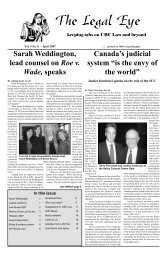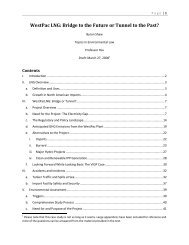The Legal Eye - Faculty.law.ubc.ca - University of British Columbia
The Legal Eye - Faculty.law.ubc.ca - University of British Columbia
The Legal Eye - Faculty.law.ubc.ca - University of British Columbia
Create successful ePaper yourself
Turn your PDF publications into a flip-book with our unique Google optimized e-Paper software.
A visit with Judge Mary Ellen Turpel Lafond<br />
<strong>The</strong> Honourable Judge Mary Ellen Turpel Lafond flew in from Saskatoon in mid-October for three days at UBC – three very packed days. Not only did she deliver the inaugural<br />
Marlee Kline Lecture in Social Justice, Judge Turpel Lafond also met with faculty and students associated with the Centre for Feminist <strong>Legal</strong> Studies, spoke at a lunch time session<br />
organized by the First Nations <strong>Legal</strong> Studies Program, and participated in a discussion with Native students, edu<strong>ca</strong>tors and community members at a forum at the First Nations<br />
House <strong>of</strong> Learning organized by Myrna McCallum and the First Nations Law Students Association. On top <strong>of</strong> that, she also met privately with <strong>The</strong> Honourable Alfred Scow, a former<br />
BC provincial court judge, and his wife, and with Dean Emeritus George Curtis. And she did all <strong>of</strong> this with her (adorable) six-month old son, Isaiah Denning Lafond, in tow.<br />
Justice for all?<br />
Not if you are an Aboriginal woman<br />
by Samuel Hu, Law II<br />
In delivering the inaugural Marlee<br />
Kline Lecture in Social Justice, the Honourable<br />
Judge Mary Ellen Turpel Lafond<br />
turned our attention to the plight <strong>of</strong> Aboriginal<br />
women and the struggles they face<br />
when relating to the Canadian legal system.<br />
Starting with an example <strong>of</strong> how the<br />
legal pr<strong>of</strong>ession must change in its attitude<br />
towards mothers and those who are contemplating<br />
motherhood, Judge Turpel<br />
Lafond went on to relay her personal experiences,<br />
first as a <strong>law</strong>yer and now as a judge<br />
in the provincial court in Saskatoon, in<br />
assisting and dealing with legal issues common<br />
to Aboriginal women.<br />
One issue Judge Turpel Lafond said<br />
that she faces far too <strong>of</strong>ten is the fact that<br />
Aboriginal women who have been assaulted<br />
either by their partner or a stranger<br />
<strong>of</strong>ten do not continue with criminal proceedings.<br />
Among the reasons cited by Judge<br />
Turpel Lafond are the fear <strong>of</strong> re-victimization<br />
in the witness box, fear <strong>of</strong> revenge at<br />
the hands <strong>of</strong> their attacker, and a mistrust/<br />
misunderstanding <strong>of</strong> the legal system.<br />
Judge Turpel also talked about dealing<br />
with the <strong>ca</strong>ses <strong>of</strong> youth affected by fetal<br />
alcohol syndrome. <strong>The</strong>se youths – many<br />
<strong>of</strong> whom are young Aboriginal women –<br />
are seen as easy targets for violence and<br />
victimization. However, as a result <strong>of</strong> their<br />
disability, they are <strong>of</strong>ten unable to provide<br />
solid testimony in court.<br />
Unfortunately, as Judge Turpel Lafond<br />
pointed out, the issues facing Aboriginal<br />
women are not isolated to criminal <strong>law</strong><br />
matters. One other glaring example <strong>of</strong> how<br />
the <strong>law</strong> works against Aboriginal women<br />
is that the Indian Act does not allow women<br />
to have any interest in a matrimonial home<br />
that is lo<strong>ca</strong>ted on reserve, in the event <strong>of</strong> a<br />
divorce. This has led to many successful<br />
Aboriginal women deciding not to live on<br />
reserves, which only serves to separate them<br />
and their families from their culture.<br />
So what <strong>ca</strong>n be done?<br />
Judge Turpel Lafond suggests that<br />
change must begin by eliminating the indifference<br />
that those in the legal pr<strong>of</strong>ession<br />
show towards Aboriginal women. Only<br />
then <strong>ca</strong>n we begin to bridge the gap between<br />
the suffering and the justice that they<br />
so desperately require.<br />
A<strong>ca</strong>demics <strong>ca</strong>n play a vital role by focusing<br />
their research on the specific needs<br />
<strong>of</strong> aboriginal women and how those needs<br />
<strong>ca</strong>n be accommodated by the <strong>law</strong>. Lawyers<br />
and judges <strong>ca</strong>n invoke change by being conscious<br />
<strong>of</strong> the unique situations Aboriginal<br />
women come from when they are brought<br />
in front <strong>of</strong> the justice system. But most importantly,<br />
we must all ask ourselves what<br />
we <strong>ca</strong>n do to bring hope and justice to a<br />
precious but marginalized group in Canadian<br />
society.<br />
In her talk, Judge Turpel Lafond referenced<br />
the recent Amnesty International<br />
report entitled, “Stolen Sisters.” It provides<br />
a look at the treatment <strong>of</strong> the indigenous<br />
women <strong>of</strong> Canada and <strong>ca</strong>n be found at<br />
http://web.amnesty.org/library/Index/<br />
ENGAMR200012004.<br />
Marlee Kline<br />
Endowed Lectureship<br />
in Social Justice<br />
To commermorate the contributions <strong>of</strong> Pr<strong>of</strong>essor Marlee Kline to legal scholarship,<br />
teaching and social justice, the UBC <strong>Faculty</strong> <strong>of</strong> Law has established the Marlee Kline<br />
Endowed Lectureship in Social Justice. Pr<strong>of</strong>essor Kline joined the <strong>Faculty</strong> in 1989; her<br />
research focused on child welfare <strong>law</strong>, restructuring <strong>of</strong> the welfare state and the structures<br />
<strong>of</strong> sexism and racism within the <strong>law</strong>. In 2001, after a courageous battle with leukemia,<br />
Pr<strong>of</strong>essor Kline passed away.<br />
<strong>The</strong> <strong>Faculty</strong>’s goal is to raise $250,000 in order to support annual guest lecturers to<br />
UBC Law in perpetuity. <strong>The</strong> Marlee Kline Lectures will provide an invaluable opportunity<br />
for UBC students, faculty, alumni, legal pr<strong>of</strong>essionals and the general public to learn<br />
about current issues in the area <strong>of</strong> social justice. To make a special gift to this endowment,<br />
contact Janine Root, Development Coordinator, UBC <strong>Faculty</strong> <strong>of</strong> Law, 1822 East<br />
Mall, Vancouver, BC, V6T 1Z1; tel: (604) 822-6266; email: jroot@<strong>law</strong>.<strong>ubc</strong>.<strong>ca</strong>.<br />
November 2004 <strong>The</strong> <strong>Legal</strong> <strong>Eye</strong><br />
Judge Mary Ellen Turpel Lafond (centre) with her son Isaiah<br />
and <strong>law</strong> pr<strong>of</strong>essors June McCue and Michael Jackson.<br />
photo by Agnes Huang<br />
Balancing Cree <strong>law</strong><br />
with common <strong>law</strong><br />
by Myrna McCallum, Law III<br />
On October 15th, the First Nations<br />
Law Students Association hosted a discussion<br />
forum between Judge Mary Ellen<br />
Turpel Lafond and First Nations students<br />
and pr<strong>of</strong>essors from UBC, SFU and UVic<br />
and various community members. <strong>The</strong> purpose<br />
<strong>of</strong> this gathering at Sty’wet’tan Hall<br />
in the First Nations House <strong>of</strong> Learning was<br />
to provide an opportunity for Native students<br />
to hear Judge Turpel Lafond share<br />
some <strong>of</strong> her experiences, and for the students<br />
to ask questions about various legal<br />
issues affecting Native people.<br />
Judge Turpel Lafond discussed diverse<br />
subjects including traditional knowledge,<br />
treaties, land claims, alternative sentencing<br />
models and <strong>of</strong>fenders with fetal alcohol<br />
syndrome (FAS), as well as the path<br />
that led her to Harvard and subsequently,<br />
back to Saskatchewan. She stated that Cree<br />
culture and language motivated her to return<br />
to Saskatoon. “Some things <strong>ca</strong>n only<br />
be learned at home,” she said. In addition,<br />
raising her children with the determination<br />
<strong>of</strong> having them understand the Cree<br />
language is better achieved when they grow<br />
up surrounded by fluent speakers.<br />
As much as Judge Turpel Lafond enjoys<br />
working within her own community<br />
and with other Crees, she explained that<br />
her job isn’t always satisfying. One <strong>of</strong> the<br />
most disconcerting matters she encounters<br />
in her courtroom is the alarming increase<br />
in Native FAS defendants. According to<br />
Judge Turpel-Lafond, many FAS <strong>of</strong>fenders<br />
end up in correctional centres when they<br />
ought to be placed in facilities that specialize<br />
in dealing with FAS-related problems.<br />
<strong>The</strong> judicial treatment <strong>of</strong> FAS <strong>of</strong>fenders,<br />
as such, is disappointing since the<br />
courts are not required to order testing to<br />
diagnose FAS defendants. As such, a great<br />
number <strong>of</strong> defendants become undiagnosed<br />
FAS inmates. Judge Turpel Lafond realizes<br />
that although a jail sentence isn’t appropriate<br />
for these <strong>of</strong>fenders, at this time unfortunately,<br />
there are few alternatives available<br />
for FAS <strong>of</strong>fenders in the justice system.<br />
Twice, I heard Judge Turpel Lafond<br />
share that under Cree <strong>law</strong>, every child is<br />
born perfect. As such, she finds it bothersome<br />
to apply sentences prescribed by the<br />
Criminal Code to FAS <strong>of</strong>fenders, when she<br />
knows that her own culture would advise<br />
<strong>ca</strong>re and consideration over in<strong>ca</strong>rceration.<br />
Nonetheless, Judge Turpel Lafond conveyed<br />
that it is important for First Nations<br />
people to understand the <strong>law</strong> and still continue<br />
to practice their own traditional <strong>law</strong>s.<br />
<strong>The</strong> accommodation and recognition <strong>of</strong><br />
Aboriginal <strong>law</strong> has allowed for an acceptance<br />
<strong>of</strong> Cree values in the common <strong>law</strong><br />
system. This is evidenced in the relatively<br />
recent emergence <strong>of</strong> Cree circuit courts in<br />
northern Saskatchewan, the implementation<br />
<strong>of</strong> healing circles as an alternative to<br />
in<strong>ca</strong>rceration, and the introduction <strong>of</strong> Native<br />
Elders and ceremonies in correctional<br />
institutions.<br />
<strong>The</strong> time spent listening to Judge<br />
Turpel Lafond was not only inspiring but<br />
equally thought provoking. For the last<br />
three years, I have focused solely on learning<br />
the common <strong>law</strong> but my real passion,<br />
as I was reminded, is in practicing and protecting<br />
Cree <strong>law</strong> in conjunction with<br />
practicing common <strong>law</strong>. And from the stories<br />
Mary Ellen shared, it sounds like balancing<br />
both will be quite the challenge.<br />
Good thing I am familiar with walking a<br />
tightrope!<br />
Page 5






![Case Rule Topic [1] Canadian Dyers Ass. Ltd. v. Burton (1920) 47 ...](https://img.yumpu.com/3777956/1/190x146/case-rule-topic-1-canadian-dyers-ass-ltd-v-burton-1920-47-.jpg?quality=85)